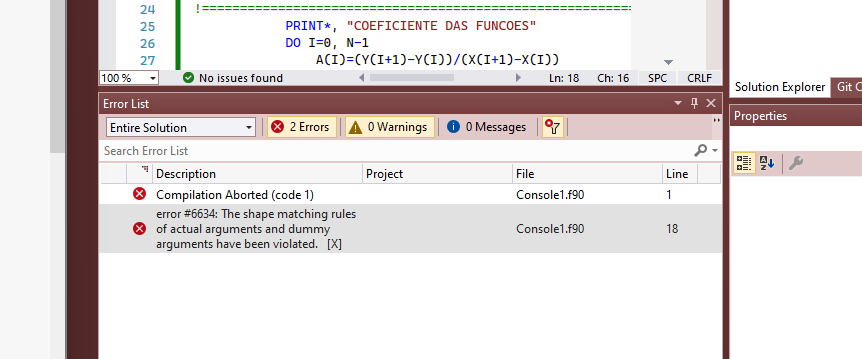- Mark as New
- Bookmark
- Subscribe
- Mute
- Subscribe to RSS Feed
- Permalink
- Report Inappropriate Content
Hello, everyone.
Please, could somebody help-me with the code below? It is resulting in infinity value.
PROGRAM MR
!============================================================
!DECLARACAO DAS VARIAVEIS
!============================================================
IMPLICIT NONE
REAL, EXTERNAL::F
INTEGER, PARAMETER :: N=6, NPC=4
INTEGER I, J
REAL :: X(0:N),Y(0:N),A(0:6),B(0:6),HP,XP(0:NPC),P(0:NPC)
OPEN(UNIT=20, FILE="FUNCA.txt", STATUS="UNKNOWN")
!============================================================
!DADOS DA FUNCAO INTERPOLADA
!============================================================
PRINT*, "DADOS DA FUNCAO"
DO I=0, N
X=X(I)+1
Y(I)=F(X)
WRITE(20,*)X(I),Y(I)
WRITE(*,*)I,X(I),Y(I)
END DO
!============================================================
!COEFICIENTES DAS FUNCOES INTERPOLADAS
!============================================================
PRINT*, "COEFICIENTE DAS FUNCOES"
DO I=0, N-1
A(I)=(Y(I+1)-Y(I))/(X(I+1)-X(I))
B(I)=(Y(I)*X(I+1)-(I)*Y(I+1))/(X(I+1)-X(I))
WRITE (*,*)I,A(I),B(I)
END DO
END PROGRAM MR
!============================================================
!FUNCAO
!============================================================
REAL FUNCTION F(X)
IMPLICIT NONE
REAL*4::x
F = SIN(X/2)
END
The results is:
DADOS DA FUNCAO
0 1.00000000 0.479425550
1 2.00000000 0.841470957
2 3.00000000 0.997494996
3 4.00000000 0.909297407
4 5.00000000 0.598472118
5 6.00000000 0.141120002
6 7.00000000 -0.350783229
COEFICIENTE DAS FUNCOES
0 Infinity Infinity
1 Infinity Infinity
2 -Infinity Infinity
3 -Infinity Infinity
4 -Infinity Infinity
5 -Infinity Infinity
Thank you!!
- Mark as New
- Bookmark
- Subscribe
- Mute
- Subscribe to RSS Feed
- Permalink
- Report Inappropriate Content
Would the following represent what you intend?
DO I=0, N
!**change** X=X(I)+1
X(I)=I+1
!**change** Y(I)=F(X)
Y(I)=F(X(I))
WRITE(20,*)X(I),Y(I)
WRITE(*,*)I,X(I),Y(I)
END DO
Link Copied
- Mark as New
- Bookmark
- Subscribe
- Mute
- Subscribe to RSS Feed
- Permalink
- Report Inappropriate Content
You need to fix this error first
I am usign the latest compiler IFX and IFORT both complain.
- Mark as New
- Bookmark
- Subscribe
- Mute
- Subscribe to RSS Feed
- Permalink
- Report Inappropriate Content
PRINT*, "DADOS DA FUNCAO"
DO I=0, N
X=X(I)+1
Two issues with the above:
1) At the point of execution of line 3 (line 17 of posted code), the array X was(is) undefined.
2) The statement X=X(I)+1, takes the scalar variable result of the expression "X(I)+1", and assigns it to the entire array X(0:N). In this case X(0:N) receives "undefined value at X(0) +1", and repeats this for "X(1)+1", ... "X(N)+1". And at the end of the loop, "X(N)+1". Note, the entire array of X changes at each iteration (each iteration using undefined values including values defined using undefined values).
EDIT: Strike (1) the above, apparently the code snip above is missing lines that defined the values of X(0:9).
Point (2) may still be of importance.
Jim Dempsey
- Mark as New
- Bookmark
- Subscribe
- Mute
- Subscribe to RSS Feed
- Permalink
- Report Inappropriate Content
Thanks you for the answer @jimdempseyatthecove
In this case, how could I fix it? I just need to make an array from 0-N and after use the values of this array to input in a function
- Mark as New
- Bookmark
- Subscribe
- Mute
- Subscribe to RSS Feed
- Permalink
- Report Inappropriate Content
Would the following represent what you intend?
DO I=0, N
!**change** X=X(I)+1
X(I)=I+1
!**change** Y(I)=F(X)
Y(I)=F(X(I))
WRITE(20,*)X(I),Y(I)
WRITE(*,*)I,X(I),Y(I)
END DO
- Mark as New
- Bookmark
- Subscribe
- Mute
- Subscribe to RSS Feed
- Permalink
- Report Inappropriate Content
Note, the second change is what JohnNichols pointed out as an error to line 18,
X is a rank-1 array
F(X) is a rank-1 array of SIN's of the array X.
This cannot be assigned to a scalar.
Jim Dempsey
- Mark as New
- Bookmark
- Subscribe
- Mute
- Subscribe to RSS Feed
- Permalink
- Report Inappropriate Content
Now it works!! Thank you so much!!!
- Subscribe to RSS Feed
- Mark Topic as New
- Mark Topic as Read
- Float this Topic for Current User
- Bookmark
- Subscribe
- Printer Friendly Page
